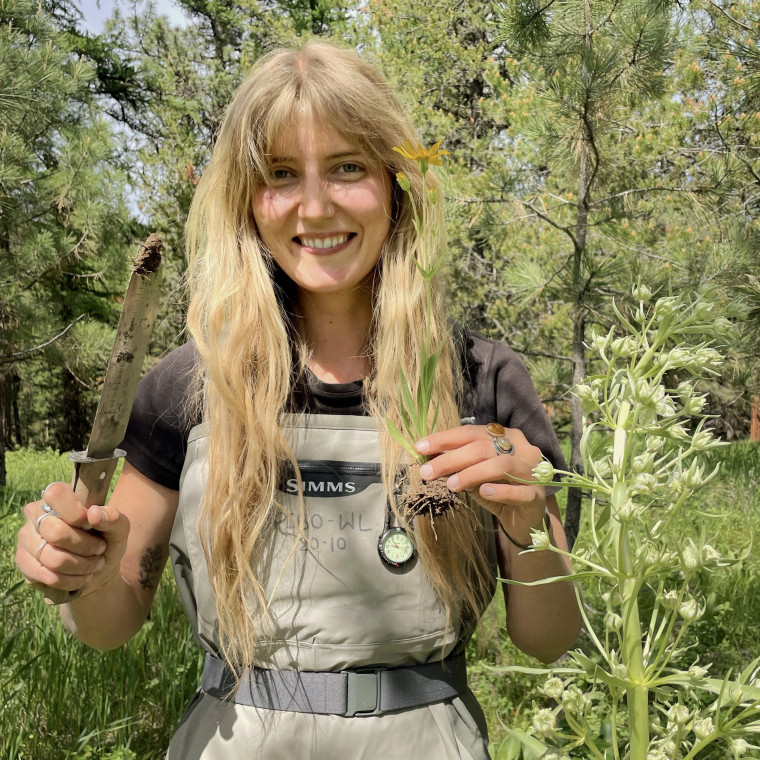Alex Olsen
L&C taught me that you can get excited about the subjects you study. I learned how to enjoy my work through uplifting relationships, curiosity, wonder, and dedication.

Pronouns
Degree and Class Year
Hometown
Current City
Major
Extracurriculars
Overseas study
Job Title, Organization
What three words would you use to describe L&C?
What made you want to come to Lewis & Clark?
I was raised in the dense woods of Western Oregon. While walking the tree-lined cobblestone paths that wind through campus, I immediately felt at home. I also felt that the intimate classroom sizes and smaller college community would be a great support system for me to grow and to learn.
What have you been doing since graduation?
Since graduation, I have been exploring the western United States through various seasonal biology technician positions. I’ve monitored invasive plants in Eastern Nevada mountains and examined arthropods in Hawai’i Volcanoes National Park. I am currently surveying riparian plant communities and stream habitat across Idaho, Montana, Oregon, and Nevada.
How did Lewis & Clark prepare you for your job?
Lewis & Clark’s biology program is very engaging. Class work is generally geared toward curiosity and conceptual thinking, which has been invaluable as I navigate field work, and I expect will be equally helpful when I begin graduate school. We were exposed to field work and learned how to develop our own studies. I also often find myself applying skills acquired in my undergraduate work in Lewis & Clark’s biology labs, such as using Python to analyze data.
What would you say is the most important thing you learned at Lewis & Clark?
More than anything, I learned that you can get excited about the subjects you study. I learned how to enjoy my work through uplifting relationships, curiosity, wonder, and dedication. This core lesson radiates beyond my career and drives me toward a joyful and fulfilled life.
Why did you major in biology?
I majored in biology in the hopes that I could join the scientific community studying and celebrating the world’s biodiversity!
How do you stay connected to Lewis & Clark as an alum?
I still feel very connected to my classmates from L&C. I also really enjoy reconnecting with my professors and mentors from Lewis & Clark, and I am so grateful for how they shaped my life and career. I hope to provide more Lewis & Clark students summer field employment opportunities under my current program.
How do you describe the liberal arts?
To me, liberal arts is an open, colorful door that rounds your learning experience into a sphere of history, culture, science, and art.
What was your favorite class? How did it expand your knowledge?
I truly loved all of my upper biology courses at Lewis & Clark. I especially enjoyed Dr. Greta Binford’s Invertebrate Zoology course. Throughout the semester, she walked our class through the entire tree of life, up until the evolution of vertebrae. Along the journey, we stopped to marvel at the brainless intelligence of a jellyfish, the miraculous, lantern-like teeth of a sea urchin, the bristles of an earthworm, the almond-like smell of a millipede, the clever coating of beetles, and countless other curiosities. The course shaped the way I view my place in the web of all things, and made me adore the small and the strange creatures that are the backbone of our ecosystems. We also went on several field trips and learned to preserve, catalog, and describe an order of arthropods. The course was challenging and brilliant.
Where did you find your community on campus?
I found my community on campus in the heart of the biology department, surrounded by the Natural History Club, L&C Herbarium, undergraduate labs, and my professors and classmates.
Who was your mentor on campus? Why do you consider this person your mentor?
My mentor was the ever-curious and kind Parvaneh Abbaspour, the science and data services librarian. She encouraged every question I could possibly ask about flowers, moths, moss, while also being the pillar of the NHC. She is behind the scenes on countless student biology projects. Without her mentorship I surely would not have found such a happy home in the field of biology.
If you studied overseas while at Lewis & Clark, how did you choose your program? What did your overseas study add to your L&C experience?
I came into Lewis & Clark intending to study world language. I changed my major to biology, but continued to take Hispanic studies courses until my graduation. I decided to study in Valparaíso, Chile, and do a home stay to study Spanish and experience a different culture. The program timing allowed me to be in South America for a total of six months. The entire experience was very eye and heart opening. My time in Chile provided me with lifelong friends, and gave me the confidence to go just about anywhere, which eventually launched my choice of remote field work.
More Admissions Stories
Admissions is located in Frank Manor House on the Undergraduate Campus.
MSC: 32
email admissions@lclark.edu
voice 503-768-7040
fax 503-768-7055
Vice President of Admissions and Financial Aid
Eric Staab
Admissions
Lewis & Clark
615 S. Palatine Hill Road MSC 32
Portland OR 97219

